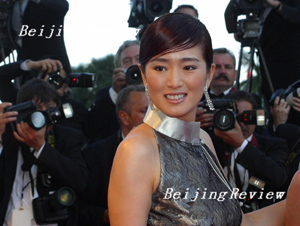
From 1949 to 1966, the vitality of the new People’s Republic and enthusiasm of the people were projected on the screen, with Chinese cinema reflecting the events of the time. Filmmakers working in the state-owned studios produced new films and created a number of classic stories that are culturally and artistically rich. These films provided people with spiritual power in a material-deficient period. Even today, the old films can still move audience members who saw them decades ago.
“It’s all because of you that I become who I am,” said scientist Xiu Ruijuan to Qin Yi, a movie star Xiu liked. When Xiu was 12, her father took her to see a movie in which Qin acted as a heroine in the War of Resistance Against Japanese Aggression. The heroine deeply affected little Xiu and influenced her life.
In 1962, the Hundred Flowers Awards were established by China’s Popular Cinema magazine. The awards represent the opinion of the general film-going public as they are selected by ordinary voters. The Red Detachment of Women won the prizes of best feature film, best director, best actress and best supporting actor at the first awards ceremony.
Growing Mature
When the Cultural Revolution ended in 1976, the problem facing Chinese filmmakers was how to rebuild culture in the wake of a purge.
Romance on Lushan Mountain, produced in 1980, was described in an Agence France-Presse article at the time as being representative of a new trend in Chinese fashion and moviemaking. In fact, this movie was not a great breakthrough, but in the eyes of China’s culturally starved audiences, Romance on Lushan Mountain was a feast. The heroine in the movie changed her clothes dozens of times on the high mountain.
“The young women in Shanghai at that time were very fashion-conscious. Some even brought their tailors to the cinema and asked the tailors to turn out clothes exactly like the heroine’s,” said director Huang Zumo, still proud of his movie’s influence.
Apart from clothing, Romance touched the heart of the people by way of a little kiss. Dressed in bathing suits, the young female character, with a wild look in her eyes, said to the young man, “You are such a fool, but so adorable,” and pressed her lips slightly onto his face. It was breaking news at the time, for while kissing had been prevalent in the movies of the 1930s and 1940s, after 1949, when the People’s Republic of China was founded, kissing became extinct from the screen. Romance brought it back.
Before Romance, the movie Reverberations of Life, released in 1979, had tried to break the taboo of kissing in movies after the Cultural Revolution. However, the director didn’t dare to let the kiss be fully exposed to the audience. As the two young characters are about to kiss each other goodbye, the director deliberately arranged a scenario in which the mother of the young woman suddenly opens the door, putting an abrupt end to any kissing. By doing this, the director also avoided criticism.
|
